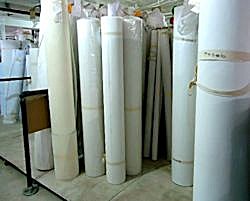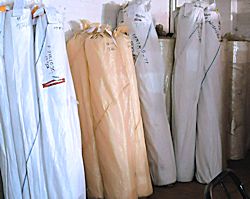
Products
Fabric Selection
Fabric Type |
Characteristics |
|
| Polypropylene | Offers good tensile strength and abrasion resistance. They perform well in organic and mineral acids, solvents and alkalies. Polypropylene is attacked by nitric and chlorosulphonic acids, sodium and potassium hydroxide at high temperatures and concentrations. pH range: 2-12 Temperature: up to 190° F |
|
| Polyester | Offers good resistance to most acids, oxidizing agents and organic solvents. Concentrated sulfuric and nitric acids are the exception. Polyesters are dissolved by alkalies at high concentrations. pH range: 2-9 Temperature: up to 325° F |
|
| Nylon | Good tensile strength and alkali resistance but is degraded by mineral acids and oxidizing agents. This reaction is accelerated at high concentrations and temperatures. pH range: 2-8 Temperature: up to 250° F |
|
| Polyethylene | Synthetic resin adapted for extrusion of yarn and staple fibers. Excellent Resistance to mildew. Same tensile strength wet and dry. pH range: 2-12 Temperature: up to 176° F |
|
| Cotton | Good abrasion resistance and mechanical strength. It is, however, subject to rot, mildew and shrinkage. pH range: 3-10 Temperature: up to 225° F |
|
| Nomex | Resist attack by mild acids, mild akalies and most hydrocarbons. Resistance to sulfur oxides above the acid dew point at temperatures above 300°F is better than polyester. Flex resistance is excellent. pH range: 2 - 12 Temperature: up to 425°F |
|
| Teflon | Excellent chemical resistance throughout the pH range. High particulate collection. Efficiency and excellent abrasion resistance. pH range: Any Temperature: up to 500° F |
|
*Additional fabrics available upon request.

